suppose与but
suppose的用法 (2)

suppose的用法suppose是一个常见的动词,用于表示假设、设想和推测。
在英语中,suppose可以用于不同的情况和句型,具体用法如下:1. 表示假设suppose可以用于表达假设,即假定某种情形成立。
例如:•I suppose she will be here soon.(我想她很快就会来。
)•Let’s suppose, just for a minute, that we had all the money we wanted.(让我们假设,只是为了一分钟,我们有我们想要的所有钱。
)2. 表示推测suppose可以用于表示根据已有的信息或事实作出合理的推测。
例如:•They are running late. I suppose there must be traffic on the road.(他们迟到了。
我猜路上肯定有交通堵塞。
)•It’s been raining all day. I suppose the picnic will have to be canceled.(整天都在下雨。
我想野餐将不得不取消。
)3. 表示责备或怀疑suppose还可以用于表示对某人的责备、怀疑或猜测。
例如:•I suppose you forgot to lock the door.(我猜你忘记锁门了。
)•He is supposed to be the best in his field, but I don’t see anything special about him.(他应该是他领域中最好的,但我没有看出他有什么特别之处。
)4. 与句型搭配suppose还可以与一些特定的句型搭配使用,表达不同的含义。
以下是其中一些常见的句型:•suppose that + 句子:用于引导一个假设情况。
例如:Suppose that you won the lottery, what would youdo?•suppose (that) + 主语 + 动词:用于表达责备或怀疑。
新概念第二册课堂笔记Lesson69
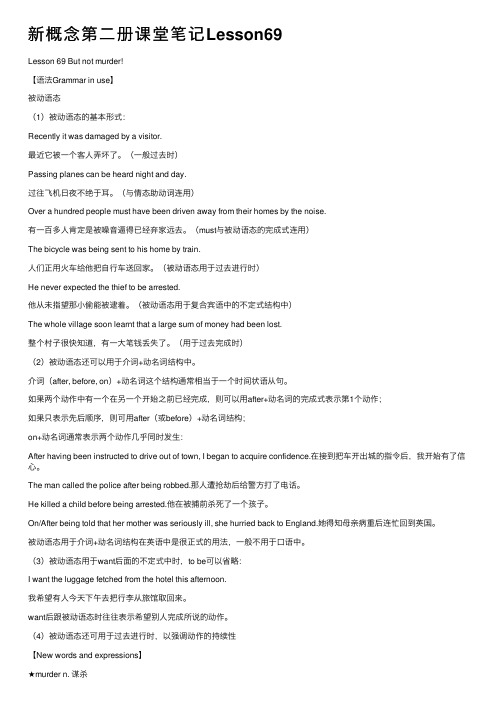
新概念第⼆册课堂笔记Lesson69Lesson 69 But not murder!【语法Grammar in use】被动语态(1)被动语态的基本形式:Recently it was damaged by a visitor.最近它被⼀个客⼈弄坏了。
(⼀般过去时)Passing planes can be heard night and day.过往飞机⽇夜不绝于⽿。
(与情态助动词连⽤)Over a hundred people must have been driven away from their homes by the noise.有⼀百多⼈肯定是被噪⾳逼得已经弃家远去。
(must与被动语态的完成式连⽤)The bicycle was being sent to his home by train.⼈们正⽤⽕车给他把⾃⾏车送回家。
(被动语态⽤于过去进⾏时)He never expected the thief to be arrested.他从未指望那⼩偷能被逮着。
(被动语态⽤于复合宾语中的不定式结构中)The whole village soon learnt that a large sum of money had been lost.整个村⼦很快知道,有⼀⼤笔钱丢失了。
(⽤于过去完成时)(2)被动语态还可以⽤于介词+动名词结构中。
介词(after, before, on)+动名词这个结构通常相当于⼀个时间状语从句。
如果两个动作中有⼀个在另⼀个开始之前已经完成,则可以⽤after+动名词的完成式表⽰第1个动作;如果只表⽰先后顺序,则可⽤after(或before)+动名词结构;on+动名词通常表⽰两个动作⼏乎同时发⽣:After having been instructed to drive out of town, I began to acquire confidence.在接到把车开出城的指令后,我开始有了信⼼。
过去未曾实现的愿望表达方式种
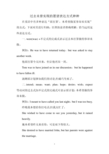
过去未曾实现的愿望表达方式种种在英语中有多种表达“原打算`,本希望做某事却未实现”的方式,下面对其进行归纳,以帮助读者准确理解,恰当运用这些表达方式。
一. were(was) +不定式的完成式表示过去本打算做的事却未做。
例如:He was to have returned today,but was asked to stay another week.他原打算今天回来,但让他再呆一周。
Tom was to have joined us in our discussion,but he happened to have fallen ill.汤姆原计划参加我们的讨论,但碰巧生病了。
二. intend,mean,want,plan,hope,desire,wish,expect 等动词的过去式加不定式的完成式可表示原计划,本希望做的事却未做。
例如:I meant to have called you last night,but I was too busy.昨晚我本想给你打电话,但我太忙了。
She wished to have come to see you yesterday, but it rained heavily.她本希望昨天来看你,可是雨下得很大。
She desired to have married John, but her parents were against the marriage.她非常想嫁给约翰,可是父母反对这桩婚事。
有的语法书上提到上面这些动词的过去式加上不定式的一般式也可表示过去未曾实现的愿望,打算或意图。
例如:I intended to write her a letter yesterday, but I forgot to.昨天我本想给她写封信,但后来忘了。
三. intend,mean,want,plan,hope,desire,wish,expect 等动词的过去完成式后加不定式的一般式也可表达此意。
简单词汇与高级词汇转换50个,学会就能拿高分
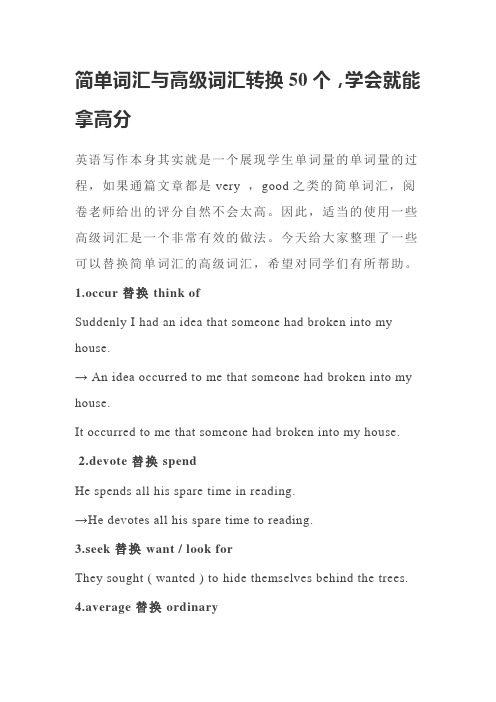
简单词汇与高级词汇转换50个,学会就能拿高分英语写作本身其实就是一个展现学生单词量的单词量的过程,如果通篇文章都是very ,good之类的简单词汇,阅卷老师给出的评分自然不会太高。
因此,适当的使用一些高级词汇是一个非常有效的做法。
今天给大家整理了一些可以替换简单词汇的高级词汇,希望对同学们有所帮助。
1.occur 替换 think ofSuddenly I had an idea that someone had broken into my house.→ An idea occurred t o me that someone had broken into my house.It occurred to me that someone had broken into my house.2.devote 替换 spendHe spends all his spare time in reading.→He devotes all his spare time to reading.3.seek 替换 want / look forThey sought ( wanted ) to hide themselves behind the trees.4.average 替换 ordinaryI’m an average ( ordinary ) student.5.but 替换 veryThe film we saw last night was very interesting.→The film we saw last night was nothing but interesting.6.seat替换 sitOn his way to school, he found an old lady seated (sitting) by the road, looking worried.7.suppose替换 shouldHe is supposed to ( should ) have driven more slowly.8.appreciate替换 thankThank you very much for you help.→We appreciate your help very much. / Your help is much appreciated.9.the case 替换 trueI don’t think it is the case ( true ).10.on替换 as soon asAs soon as he arrived, he began his research.→ On his arrival, he began his research..11.due to替换 because ofHe arrived late due to ( because of ) the storm.12.cover 替换 walk/readAfter covering (walking) 10 miles, we all felt tired.13.contribute to 替换 be helpful/usefulPlenty of memory work is undoubtedly helpful to English study.→Plenty of memory work will undoubtedly contribute to English study.14.round the corner 替换 coming soon/ nearby①The summer vacation is round the corner ( coming). Do you have any plans?② Li Ming studies in a school round the corner (nearby).e to light 替换 discoverThe family were so pleased when they discovered the lost jewels.→The family were so pleased when the lost jewels came to light.16.have a ball 替换 have a good time/enjoy oneselfAfter visiting the workshop, we went back to school. Every one of us had a ball ( had a good time ).e up with 替换 think ofJack is very clever. He often comes up with ( thinks of ) new ideas.18.set aside 替换 saveSome students think that they should set aside some of their pocket money for books.19.be of + n. 替换 adj.The products are of high quality (very good ) and are sold everywhere in China.20.refer to 替换 talk about/of, mentionThe professor you referred to (talked about ) is very famous.21.can not but/ can not help but替换 have to doI could not but (had to) go home.22.more often than not 替换 usuallyMore often than not (Usually), the meaning of many words can be easily guessed.23.lest 替换 so that /in order thatI wrote down his telephone number so that I would not forget it.→I wrote down his telephone number lest I (should) forget it.24.be long for sth./ be long to do sth.替换 want to do sth./wish forI want to see you very much.→I am long to see you.25.be caught up in/be crazy about/be absorbed in/be addicted to替换 be interested inHe is caught up in ( very interested in ) collecting stamps.26.more than 替换 very①I’m very glad to learn that you are coming in September. →I’m more than glad to learn that you are coming in September.② If there is anything I can do for you, I would be more than glad to help.27.perfect (ly) 替换 good/ very wellHe speaks perfect ( good ) English./ He speaks English perfectly ( very well ).28.do sb. a/the favor 替换 helpWould you please do me the favor ( help me ) to turn down the radio?29.the other day 替换 a few days agoThe other day my brother and I went to the cinema by bicycle.30.in the course of 替换 duringIn the course of (During) the mountain-climbing, please help each other and pay special attention to your safety.31.the majority of替换 mostThe majority of (Most of ) the interviewees prefer watching TV at home to going to the cinema.32.consist of替换 be made up ofOur class consists of ( is made up of ) 50 students.33.be worn out 替换 be tired / broken①After five hours’ non-stop work, we were all worn out (tired).② My shoes are worn out (broken). Please buy me anew pair.34.as a matter of fact 替换 in fact35.attend to 替换 look after36.on condition that 替换 as long as37.nevertheless替换 however38.express one’s satisfaction with替换 be satisfied with39.spare no efforts to do 替换 try one’s best to do40.many a替换 many41.be rushed off one’s feet替换 be busy in doing42.a handful of替换 a little/some43.meanwhile替换 at the same time44.get to one’s feet 替换 stand up45.be neath替换 under46.occasionally 替换 sometimes /once in while47.for instance 替换 for example48.seldom 替换 not often49.wealthy 替换 rich50.amazing 替换 surprising。
外研版英语九年级上册Module 7 重难点知识归纳总结

Module 7【重点单词】1.discuss [dɪˈskʌs] v. 讨论,谈论2.thinker [ˈθɪŋkə] n. 思想家3.wise [waɪz] adj. 有判断力的,明智的4.review [rɪˈvju:] n. 评论(文章)5.influence [ˈɪnfluəns] v. 影响,作用于6.sense [sens] n. 道理,意义,合理性7.suppose [səˈpəʊz] v. 猜想,推测,相信,认为8.well-known ['wel'nəʊn] adj. 众所周知的,著名的9.adventure [ədˈventʃə] n. 冒险(经历)10.escape [ɪˈskeɪp] v. 逃离,逃脱11.cave [keɪv] n. 洞穴12.dead [ded] adj. 死的,去世的13.neighbour ['neɪbə] n. 邻居14.funeral [ˈfju:nərəl] n. 葬礼15.surprised [səˈpraɪzd] adj. 惊奇的,惊讶的16.alive [əˈlaɪv] adj. 活着的17.southern [ˈsʌðən] adj. 南方的18.state [steɪt] n. 州,邦19.action [ˈækʃn] n. 举止,行为,情节20.everyday [ˈevrideɪ] adj. 日常的,普通的21.dialogue ['daɪəlɒɡ] n. 对话【重点短语】1.make a list 列清单2.make sense 有意义3.by the way 顺便地;附带说说4.be well known as 作为……而著名5.be influenced by 被……影响6.write a review 写评论7.be set in 以……背景8.for a time 一度9.be supposed to 应该10.escape from 逃避;逃出11.miss school 缺课12.in return 作为报答;反过来13.turn around 翻转过来14.allow to do sth. 允许做某事15.be included in 被包括在16.for free 免费17.get lost 迷路18.run away 逃跑;逃脱19.in the form of 用……的形式20.write down 写下,记下21.disagree with 不同意22.pay for 支付【重点句型】1.We are still influenced by Confucius’ ideas.我们仍然受孔子思想的影响。
suppose的用法
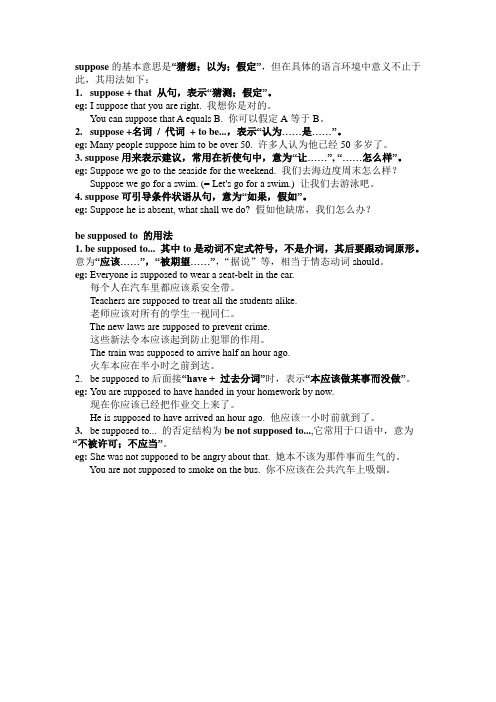
suppose的基本意思是“猜想;以为;假定”,但在具体的语言环境中意义不止于此,其用法如下:1.suppose + that 从句,表示“猜测;假定”。
eg: I suppose that you are right. 我想你是对的。
You can suppose that A equals B. 你可以假定A等于B。
2.suppose +名词/ 代词+ to be...,表示“认为……是……”。
eg: Many people suppose him to be over 50. 许多人认为他已经50多岁了。
3. suppose用来表示建议,常用在祈使句中,意为“让……”, “……怎么样”。
eg: Suppose we go to the seaside for the weekend. 我们去海边度周末怎么样?Suppose we go for a swim. (= Let's go for a swim.) 让我们去游泳吧。
4. suppose可引导条件状语从句,意为“如果,假如”。
eg: Suppose he is absent, what shall we do? 假如他缺席,我们怎么办?be supposed to 的用法1. be supposed to... 其中to是动词不定式符号,不是介词,其后要跟动词原形。
意为“应该……”,“被期望……”,“据说”等,相当于情态动词should。
eg: Everyone is supposed to wear a seat-belt in the car.每个人在汽车里都应该系安全带。
Teachers are supposed to treat all the students alike.老师应该对所有的学生一视同仁。
The new laws are supposed to prevent crime.这些新法令本应该起到防止犯罪的作用。
虚拟语气练习答案

虚拟语气练习答案及解释练习(一)1. were (or: should be) 13. were2. will hear 14. is3. would have been injured 15. had been4. were 16. would have compensated5. had not been 17. had6. Were he (or: Should he be) 18. were7. comes (or: should come) 19. eat8. know 20. Should9. don’t go 21. will have10. let 22. had rained11. would feel 23. wouldn’t be getting12. would have become练习(二)1. Should you fail,…2. Had I followed your advice, …3. Were he in luck (Should he be in luck), …4. Had the bomb exploded, …5. Were he late, …6. Should you lose (Were you to lose)…7. Should Mr. King not come tomorrow (Were Mr. King not to come tomorrow), …练习(三)1. If you had enough clothes on, you wouldn’t feel cold.2. If there hadn’t been any passing showers, our picnic would have been perfect.3. If I hadn’t got so much help from Ralph, I should not (would not) have done so well in the difficult examination.4. If I were not engaged in writing an urgent report, I could go to the cinema with you.5. If we hadn’t been walking for a whole day, we shouldn’t be feeling so tired now.6. If Dylis hadn’t been practising Chinese constantly, he couldn’t speak it fluently.7. If you had made everything clear to Keith and Josephine, they would have agreed to join us in our research project.8. If I had money with me now, I could buy the camera.9. If he had not left his new photos at home, he could show them to us now.10. If he were not running a high fever, we could ask him to show up at the party.11. If you hadn’t been careless, you wouldn’t have made such a silly mistake.12. If Hob and Olaf had followed the right procedure, they wouldn’t have failed in theexperiment.13. If Howard were not fastidious about his food and clothing, he would havedeposited a lot of money in the bank.14. If they had not built many reservoirs, the flood would have caused great damageto the people.15. If the weather had not been favorable before, the wheat would not be growing sowell now.练习(四)1. It is strange that he fail to…2. The general ordered that women and children be evacuated…3. He insisted that the boy stop doing…4. We suggested that he start at once.5. It is natural that such fears arise among…6. It is a pity that she be so forgetful.7. The supervisor recommended that all employees take a course in…8. My doctor urges that he stop drinking…9. The rule requires that all the clearks arrive…10. The rule required that all the clerks arrive…11. My friend has time and again advised that my son have a private tutor…12. It is important that the regulations be revised.13. He demanded that she leave the place…14. They asked that she not call before 9:00 a.m.15. I suggest that he wear a black suit…16. I proposed that a series of discussions be started at once.17. He proposes that the house be repaired.18. It is desirable that he take charge of the class.19. I desire that he call on me on Monday morning.20. He recommended that the reader be on the lookout for idioms.21. My idea is that we challenge them to a swimming contest.22. What do you think of Patrick’s proposal that we give a school contest nextSaturday evening?注:练习(四) 1~22题主句中的那些动词。
suppose的用法和短语

suppose的用法和短语一、suppose的基本用法和含义“Suppose”是一个常用的词语,它在英语中有多种用法和短语。
无论是作为动词还是名词,其含义都与推测、假设和认为相关。
本文将详细介绍“suppose”的用法,并举例说明。
1. 动词形式作为动词时,“suppose”表示假定、推测或认为某事可能发生。
它可以用来表达自己对某个问题的观点或假设,也可以用于引出他人可能的意见。
常见的句型结构包括:“I suppose”,“You suppose”,“He/She/It supposes”,“We suppose”等。
例如:- I suppose you are right.我想你是对的。
- She supposes that they will arrive late.她认为他们会迟到。
- We supposed he would be here by now.我们以为他现在应该在这里了。
2. 名词形式除了作为动词使用外,“suppose”也可作为名词使用,表示一个假设或推测过后得出的结论。
在这种情况下,“suppose”通常与定冠词连用,如“The suppose is...”。
例如:- The suppose is that she forgot about the meeting.假设是她忘记了会议。
二、常见的suppose短语和习语除了基本用法之外,还存在许多与“suppose”相关的常见短语和习语。
这些短语在表达中起到强调、补充或使句子结构更加复杂的作用。
1. I suppose so这个短语常用于回答问题时,表示认可或同意对方的观点。
它确保了回答者对所说内容的推测或假设。
例如:- "Do you think he will come to the party?""I suppose so."“你认为他会来参加聚会吗?”“我想是吧。
”2. Suppose that...这个短语指出一个假设情况,引导后面的从句来阐述对某件事情可能发生的推测。
but造复合句

but造复合句在英语语法中,but是一个非常常见的连词,它主要用于表示转折、对比、否定等意义。
掌握but的使用方法和技巧,能够帮助我们更好地构建复合句,使文章表达更加丰富和生动。
一、了解but的使用场景和功能1.转折关系:当句子中出现相反或相对的观点时,可以使用but连接两个句子,表示转折关系。
例如:I thought it would rain, but it didn"t.(我以为会下雨,但是没有。
)2.对比关系:当句子中出现两个相似但又有所区别的事物时,可以使用but连接两个句子,表示对比关系。
例如:She is taller than her sister, but they have the same eyes.(她比她妹妹高,但她们有相同的眼睛。
)3.否定关系:在一些否定句中,可以使用but表示进一步的否定。
例如:I don"t know everything, but I know enough to help you.(我不知道一切,但我知道足够帮助你的。
)二、学习如何构建复合句1.使用主句和从句:首先,我们需要了解如何构建一个基本的复合句。
一个复合句通常包括一个主句和一个或多个从句。
例如:Although she is busy, she always finds time to help others.(尽管她很忙,但她总是找到时间帮助别人。
)2.加入but连接句子:在构建复合句时,我们可以使用but连接两个句子,以表达转折、对比或否定等关系。
例如:She looks happy, but deep inside, she is hurting.(她看起来很高兴,但内心却在受伤。
)3.添加合适的修饰词和短语:为了使句子更加丰富和生动,我们可以在句子中添加一些修饰词和短语。
例如:Although he is still young, he has already shown remarkable talent in music.(尽管他年纪还小,但他已经在音乐方面展现出了非凡的天赋。
suppose的用法和短语

suppose的用法和短语"Suppose" 是一个多功能的词汇,可以用作动词、名词和连接词。
下面是一些 "suppose" 的常见用法和短语:1.动词用法:a. 表示假设或推测:We suppose that it will rain tomorrow.(我们假设明天会下雨。
)b. 表示猜测或推测:I suppose he is busy.(我猜他很忙。
)c. 表示认为或假设:I suppose I'll have to go now.(我猜我现在得走了。
)d. 表示认为可能或有可能发生:It is supposed to be the best restaurant in town.(据说这是镇上最好的餐厅。
)e. 表示允诺或答应:I suppose I could help you with that.(我可以帮你做这个。
)f. 表示假定或设想:Suppose we go for a walk.(假设我们去散步吧。
)2.名词用法:a. 在口语中,常用于“what if” 后面,表示假设或设想:Whatif we miss the train, what will we do then?(如果我们错过了火车,我们该怎么办?)3.连接词用法:a. 用于表示条件或假设:Suppose you win the lottery, what would you do?(假设你中了彩票,你会做什么?)b. 用于表示让步或反驳:Suppose I am wrong, what difference does it make?(假设我错了,又有什么区别呢?)4.相关短语和表达:a. "suppose that":表示假设或推测的常用短语,相当于"assuming that" 或 "if":Suppose that I'm right, what would you do?(设想我是对的,你会怎么做?)b. "suppose so":表示同意或接受其中一种观点或意见:I suppose so, if you say so.(如果你这么说,我就同意。
英语中表示“本想”的6种时态
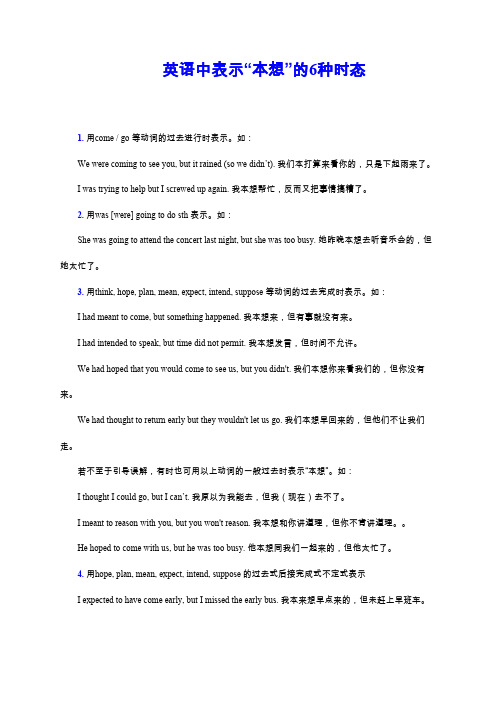
英语中表示“本想”的6种时态1. 用c ome / go 等动词的过去进行时表示。
如:We were coming to see you, but it rained (so we didn’t). 我们本打算来看你的,只是下起雨来了。
I was trying to help but I screwed up again. 我本想帮忙,反而又把事情搞糟了。
2. 用w as [were] going to do sth 表示。
如:She was going to attend the concert last night, but she was too busy. 她昨晚本想去听音乐会的,但她太忙了。
3. 用t hink, hope, plan, mean, expect, intend, suppose 等动词的过去完成时表示。
如:I had meant to come, but something happened. 我本想来,但有事就没有来。
I had intended to speak, but time did not permit. 我本想发言,但时间不允许。
We had hoped that you would come to see us, but you didn't. 我们本想你来看我们的,但你没有来。
We had thought to return early but they wouldn't let us go. 我们本想早回来的,但他们不让我们走。
若不至于引导误解,有时也可用以上动词的一般过去时表示“本想”。
如:I thought I could go, but I can’t. 我原以为我能去,但我(现在)去不了。
I meant to reason with you, but you won't reason. 我本想和你讲道理,但你不肯讲道理。
英语中应该怎么表达未实现的安排和意图

英语中应该怎么表达未实现的安排和意图英语中有多种结构可用来表示未曾实现的意图、安排和希望,现归纲如下:一 . 用“ Was / Were going to + 动词原形”表示未曾实现的意图或打算。
例如:1. I was going to see you last night, but the heavy rain prevented me.昨晚我本来要来看你,但一场大雨使我来不了了。
2. I was going to finish my article yesterday evening, but my friend arrived, so I did not have time.昨晚我本来打算写完我的文章,但我的朋友来了,所以我没时间写完。
二 . 用“ Was / Were to + 动词不定式完成式”表示未曾实现的安排。
例如:1. He was to have given the first talk, but he came late.他本来要第一个发言,但他来晚了。
2. The plain was to have taken off at six, but something went wrong.飞机本来在六点钟起飞,但出了故障。
三 . 用 think, expect, suppose, hope believe 等动词的.过去完成时,后接宾语从句表示未实现的意图、打算或希望等。
例如:1. Peter had thought the plain would have taken off by the time he arrived at the airport.彼得原以为在他到达机场时飞机可能已经起飞了。
2. They had hoped that they would be able to see more of Beijing,but time didn’t permit.他们本来希望在北京多看些地方,但时间不允许。
suppose最详细的用法大全

suppose最详细的用法大全suppose 一词的用法很灵活,在高考中常以不同的面目出现。
这里对 suppose 的用法进行归纳总结。
1. suppose 意为“认为,猜测”,后常接“宾语+宾语补足语”形式。
① suppose sb./sth. to have done 的结构。
They supposed the paper to have been lost during the war. 他们认为那个文件在战争期间丢失了。
The police arrested him because he was supposed to have killed the lady. 警察逮捕了他,认为他杀死了那位女士。
② suppose sb./sth. (to be) +形容词 / 介词短语的结构。
Everyone supposes him (to be) poor, but he is really quite wealthy. 大家都认为他很穷,实际上很很阔。
She was supposed to be an excellent student in our school. 她被认为是我校优秀的学生。
③ suppose + it +形容词 / 名词+ to do 的结构。
I suppose it my duty to help those in poverty. 我认为帮助那些处于贫困中的人是我的义务。
2. suppose 可用于“ be supposed +不定式”的结构。
① be supposed to do sth. = should do sth. 意为“应该 / 理应做某事”,表示被期望或被要求(按规则、惯例)做某事。
We are supposed to help each other. 我们理应互相帮助。
(要求)You are supposed to hand in your papers before class is over. 希望你下课前交卷子。
高中英语单词天天记suppose素材

· suppose· v. [sə'pəʊz] ( supposes; supposed; supposing )·· 双解释义· vt.料想,猜想,以为accept as true or probable; imagine; assume· vt.假定,假设pretend that (sth) is true; take (sth) as a fact· vt.作为建议来考虑consider as a proposal· vt.须以…为条件require (sth) as a condition· 基本要点•1.suppose的基本意思是指在证据不全、情况未确定时所作的猜想。
可指缺乏确切的事实但可根据一些现象来推测; 也可指提出合乎逻辑推理的假设来论证某事; 还可指委婉地提出建议。
2.suppose是及物动词,可接名词、代词或that/wh-从句(可用于虚拟式)作宾语。
还可接以“(to be+) n./adj./prep.-phrase”或动词不定式、现在分词充当补足语的复合宾语。
suppose搭用to be构成的复合宾语,如用于被动结构, to be有时可以省去。
3.suppose作“作为建议来考虑”解时,常用于祈使句,用以提出建议,可译为“…如何〔怎么样〕?”。
与“what if”用法相似,动词一般用现在时或过去时。
用过去时时,所提建议听起来不十分肯定。
4.suppose作“准许”解时,常用于被动结构或否定结构,后接动词不定式。
5.suppose在主句中用过去时时,如宾语从句中的谓语动词所表示的动作先于suppose,则该动词须用过去完成时。
6.suppose在表示过去未曾实现的意图、打算或愿望时须用过去完成时。
7.suppose引导否定意义的宾语从句时,须使用转移否定结构。
8.suppose是表示思想状态的动词,通常不用于进行体。
名校版高考高中英语语法详解 动词suppose的用法及考点

名校版高考高中英语语法详解动词suppose的用法及考点动词suppose意思是“假定,认为,想象,需要……条件”suppose后直接跟宾语。
比如: An invention supposes an inventor.要有发明,必须先有发明者。
再比如:Let us suppose another war.让我们假定再来一场战争吧。
suppose可以跟that引导的从句,表示“认为,猜想”,从句用将来时或一般现在时(表示将来要发生的动作)。
比如:I suppose that you will be there.我猜想你会到那里去的。
再比如:I suppose it rains tomorrow.我猜想明天会下雨。
suppose也可以用在祈使句中。
比如:Suppose your mother saw you now.假如现在你妈妈看见你呢。
suppose的另外一种用法是suppose后面跟that引导的从句,从句中要用将来时态,表示“想,认为”。
比如:I suppose that he will be here at nine.我想他9:00会来。
suppose+that+真实条件句,表示“假如,如果”,suppose 是从属连词,不是动词。
可表示提出建议或请求,也可表示某种“假定”。
比如:Suppose I were dismissed, what should I do?假如我被解雇了,该怎么办呢?Suppose it rains, what shall we do?假如下雨,我们怎么办?另外一个需要掌握的句型是suppose sb or sth+动词不定式。
比如:I suppose him to be about fifty.我猜想他50岁左右。
再比如:They supposed the box to contain gold.他们猜想那个匣子装着金子。
另外一个常考为结构为:be supposed to do sth.这个结构是个被动形式,其中的to是动词不定式符号,后面要跟动词原形。
if,evenif,whether,unless,butfor等词的用法

If, even if, whether, unless, but for, otherwise, provided, suppose1.Even if (=even thought即便)请比较下面两个例句:You must go tomorrow if you are ready.如果你准备好了,明天你必须走。
You must go tomorrow even if you aren’t ready.哪怕你没有准备好,明天你也得走。
2.Whether…or (=if…or是否)You must go tomorrow whether you are ready or not.无论你明天是否准备好了,你都必须走。
3.Unless+肯定动词(=if+否定动词除非)Unless you start at once you’ll be late. 相当于:If you don’t start at once you’ll be late.除非你立即动身,否则你就会迟到。
Unless you had a permit you couldn’t get a job. 相当于:If you hadn’t a permit you couldn’t get a job.除非你有执照,否则你就找不到工作。
4.but for (=if it were not for /if it hadn’t been for 不然)my father pays me fees. But for that I wouldn’t be here.我父亲给我一笔补贴费。
不然我就不会在这里了。
The car broke down. But for that we would have been in time.汽车出毛病了。
要不是那个我们会及时赶到的。
5.otherwise (=if this doesn’t happen/didn’t happen/hadn’t happened否则)we must be back before midnight; otherwise we’ll be locked out.我们必须在午夜之前赶回去,否则我们就会被锁在门外。
认定 猜想英语

认定猜想英语suppose v 1 [Tf, Cn.a, Cn.t] accept as true or probable; believe; imagine; assume 认定; 认为; 以为; 猜想; 料想; 假定 What do you suppose he wanted? 你认为他想要什麽? What makes you suppose (that) I´m against it? 你根据什麽认为我反对这件事? I don´t suppose for a minute that he´ll agree, ie I´m sure that he won´t. 我认为他决不同意. She´ll be there today, I suppose. 我想她今天能到那儿去. `Will he come?´`Yes, I suppose so.´`他来吗?'`对, 我想他能来.' I suppose you want to borrow money from me again? ie showing annoyance 我猜你又要找我借钱了吧? I don´t suppose you could help me (ie Please help me) with my homework. 请你帮助我做家庭作业吧. It was generally supposed that it would not happen again. 一般都认为此事不会再发生. (fml 文) Everyone supposes him (to be) poor, but he is really quite wealthy. 大家都以为他穷, 实际上他很阔. It was widely supposed to have been lost during the war. 普遍认为那东西在战争期间丢失了. 2 [Tn, Tf, Cn.t] pretend that (sth) is true; take (sth) as a fact 假定或假设(某事物)属实; 认定(某事物) a theory which supposes the existence of other worlds besides our own 假定除地球外还存在其他有生命的天体的理论 Suppose (that) the news is true what then? 假定这消息是真的, 那又怎样? Suppose you had a million pounds how would you spendit? 假如你有一百万镑--你怎麽花呢? 3 [Tf] (used in the imperative, to make a suggestion 用於祈使句, 用以提出建议) consider as a proposal 作为建议来考虑 Suppose we go (ie Let´s go) for a swim! 咱们去游泳吧! 4 [Tn] (fml 文) require (sth) as a condition 须以(某事物)为条件 Creation supposes a creator. 有了创造者, 才能有创造. 5 (idm 习语) be supposed to do sth (a) be expected or required to do sth (by rules, custom, etc) 被期望或被要求(按规则、惯例等)做某事 Am I supposed to (ie Should I) clean all the rooms or just this one? 我是应该打扫所有的房间, 还是只这一间? You´re supposed to pay the bill by Friday. 你最晚在星期五结清这笔帐. They were supposed to be here an hour ago. 他们应该在一小时以前到达这里. (b) (infml 口) (used in negative sentences 用於否定句中) be allowed to do sth 获准做某事 You ´re not supposed to play football in the class-room. 在教室里是不准踢足球的.。
suppose中文翻译.doc

suppose中文翻译中考生在复习英语的时候掌握好英语考试大纲中要求掌握的词汇,这样在考试的时候才能知道所有的词汇,以下是教育为大家带来的2019中考英语词汇:suppose中文翻译_音标_例句参考,相信能够提高中考生的词汇量。
英音[s?p?uz] ;美音[s?p?uz] ;动词1.及物动词:认定,认为,以为,猜想,料想,假定2.及物动词:假定或假设(某事物)属实,认定(某事物)3.及物动词:用于祈使句,用以提出建议)4.及物动词:须以(某事物)为条件词形变化时态supposed,supposing,supposes单词分析这些动词均含为假设,猜想,推测之意。
assume指有很少或完全无根据的武断推测或不合逻辑的推理。
presume侧重以过去经验或根据现实的某些感觉把某事认定为是事实。
suppose常用词,意义较广泛,指缺乏确切事实,根据一些现象进行的推测,也可指为论证而提出合乎逻辑推理的某种假定,有时仅表示自己的意见。
guess常用词,指毫无根据仅凭个人主观臆断或碰运气的猜测。
postulate指为证实一个理论的正确性而进行的假设。
英语解释express a suppositionrequire as a necessary antecedent or preconditionto believe especially on uncertain or tentative groundstake for granted or as a given; suppose beforehandexpect, believe, or suppose例句In the 1990S, a politically-motivated movement praised the vague concept of Asian values as more worthy than the supposedly decadent Western values.20世纪年代出现了一种政治倾向,即大力赞扬亚洲价值观这一模糊的概念,认为它比所谓的颓废的西方价值观更有价值Even if the supposedly untrustworthy borrower does discharge his obligation, he will not pay more than he is obliged即使这个假定不可信赖的借款人会消偿他的债务,他所付的也不会多于他所欠的。
- 1、下载文档前请自行甄别文档内容的完整性,平台不提供额外的编辑、内容补充、找答案等附加服务。
- 2、"仅部分预览"的文档,不可在线预览部分如存在完整性等问题,可反馈申请退款(可完整预览的文档不适用该条件!)。
- 3、如文档侵犯您的权益,请联系客服反馈,我们会尽快为您处理(人工客服工作时间:9:00-18:30)。
suppose和supposing可用于引导条件从句吗
(自己翻译时就用supposing,因为它既是假如,又是即使之意) suppose本来是动词,supposing本来是现在分词,但它们有可用作连词,引导条件状语从句,其意为“假若”“如果”等;此时主句通常为疑问句。
如:
Supposing he can’t come, who will do the work? 假使他不能来,这工作谁做?
Supposing he does not come, shall we go without him? 如果他不来,是不是不带他去?
Suppose you were given a chance to study in America, would you accept? 假如给你一个到美国学习的机会,你会接受吗?
Suppose [Supposing] (that) we miss the train, what shall we do? 假如我们误了火车,我们将怎么办?
注意,suppose用作连词引导条件状语从句时,它必须置于主句之前,但supposing用作连词引导条件状语从句时,则可置于主句之前,也可以置于主句之后。
如:
We'd love to come and see you on Saturday, supposing I don't have to work that day. 我想星期六来看你,假若那天我不上班的话。
*由 suppose 引导的宾语从句,如果主句的主语是第一人称 I 或
we ,并且主句谓语是一般现在时态,从句的否定一般要转移到主句上来,其反意疑问句一般与宾语从句一致。
We don't suppose they will say sorry to her, will they? 我们认为他们不会对她说对不起,是吧?
注意:与 suppose 这种用法相同的还有: think, believe, imagine, expect 等。
* suppose 可用于简略答语中,用 so 代替一个肯定的宾语从句;用not 代替一个否定的宾语从句。
— Do you suppose he'll fail to catch the train?
—你认为他会错过火车吗?
— I suppose so./ I suppose not. (= I don't suppose so. )
—我想会的。
/ 我想不会。
注意:与 suppose 这种用法相同的还有: think, believe, expect, imagine 等。
但应注意 hope 和 be afraid 则不同于以上的用法。
— Will he win the game?
—Yes, I hope so./No, I hope not. (不能用 I don't hope so. )suppose ( = supposing) 可引导条件状语从句,意为“如果,假如”。
Suppose ( = Supposing) he is absent, what shall we do? 假如他缺席,我们怎么办?
注意:如果想表示“即使”,应用 supposing 而不用 suppose 。
Supposing you miss him, he is not likely to miss you. 即使你碰不到他,他也可能碰到你。
注意: suppose 或 supposing 引导的条件状语从句应用一般现在时代替将来时。
9. suppose 用来表示建议,常用在祈使句中,意为“……怎么样”。
Suppose we go to the seaside for the weekend. 我们去海边度周末怎么样?。
